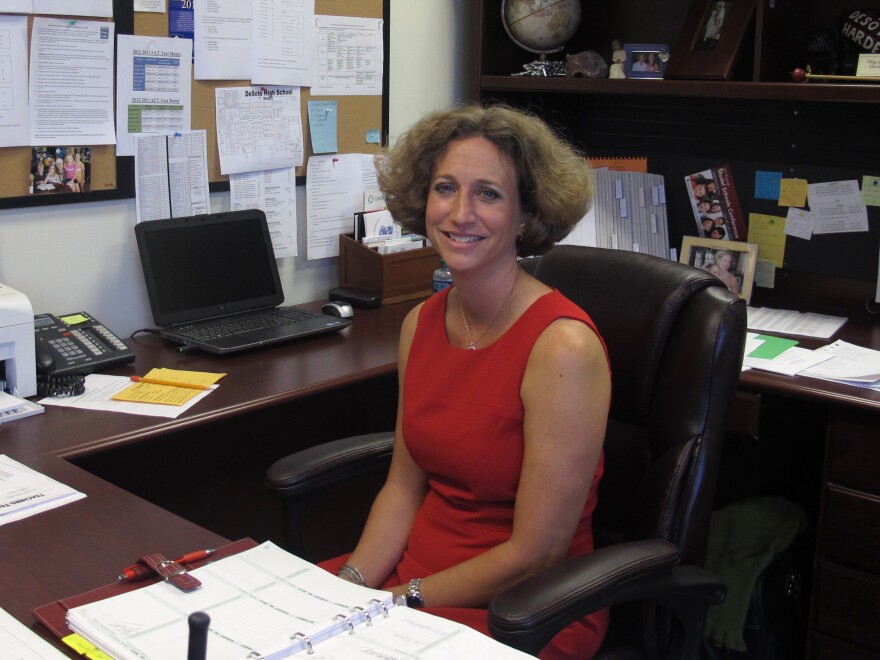Schools have been open for a couple of weeks across much of Florida, but not all of the students know who their teachers are yet. There's typically a lot of teacher turnover during the summer break, and schools can't always get vacant teaching positions filled by the time school starts.
At DeSoto County High School in southern Florida, math tutor Ronnie Padilla is filling in as the French teacher. There's only one problem: He doesn't speak any French. Across from his classroom, Alma Cendejas — the school's front-desk receptionist — is filling in as the Spanish teacher until the school can find one.
Principals across Florida say the summer break just isn't enough time to fill every open teaching position. Miami-Dade County Schools, for example, started about 100 teachers short. School officials say that's not unusual for large school districts with tens of thousands of teachers — Miami-Dade has 22,000.
Still, the vacancies mean that thousands of students are starting the school year without permanent teachers. In a school year that is only 180 days long and filled with high-stakes tests, these students are getting a late start.

Doug Peden, executive director of the American Association for Employment in Education, says it's an age-old problem, and one not limited to Florida.
"In every state, school districts — they hire late," Peden says. "And we know those classes can stay empty for a long time."
Teachers Resign At The End Of Summer
One reason some schools find themselves in this bind is because teachers sometimes wait until the very end of summer to notify schools they won't be coming back.
That's partly due to a misconception: Some teachers think they won't get their health insurance over the summer if they quit in June, even though they do. To address the problem, one district changed its contract to reflect that the end date for employment was Sept. 1, rather than the last day of school.
In Broward County — the nation's sixth-largest school district — more than 500 teachers resigned just two weeks before the start of the school year.
"It's very difficult for any district to meet that challenge," says Gracie Diaz, chief human resources officer for Broward schools. "I think we all want to have every teacher by the first day of school."
Diaz says lots of people apply — just not in the fields they're looking for. The district held a last-minute teacher job fair, hoping to fill all the vacancies. Some 800 candidates showed up, but only seven of those candidates taught math or science.
'You Learn It'
At DeSoto High last year, students went without a teacher certified in physics or chemistry for three months. Substitute teacher Sue Knight filled in for those classes. As a sub, Knight says you just "wing it."
"If it's a subject that you don't know, then you take the book home every night and you do homework," says Knight. "And you learn it."
The entire science department helped out by creating lesson plans for Knight. The school principal even brought in a retired physics teacher to help out in the classroom.

"It's very difficult, and we don't like putting students in those positions at all," Principal Shannon Fusco says. "But when we're unable to find someone with the certification, or even the ability, we do the best that we can, and we all pitch in."
'Not Good For Anybody'
Jeremy Glazer, a former teacher in Miami and Philadelphia, believes waiting until the final days of summer break to notify schools can have a negative effect on students.
But he also says volatile staffing situations cut both ways: Teachers often don't know what their role will be at a school — or if they'll even have a role — until just before classes begin.
Not only do many teachers not get to choose which subjects they're teaching, they also don't get much time to prepare if they find out weeks before the start of the school year. StateImpact Florida recently interviewed a first-year teacher who had just over a week to prepare his curriculum for the year.
"And that's not good for anybody," Glazer says. "It's not good for morale, it's not good for the teacher, it's not good for the students. It's just not a smart way to do things."
This story is part of the StateImpact Florida project. StateImpact is a collaboration between NPR and member stations examining the effect of state policy on people's lives.
Copyright 2020 NPR. To see more, visit https://www.npr.org. 9(MDA4MzM1MjM1MDEzMTg5NTk0MzNmOTQ5MA004))



